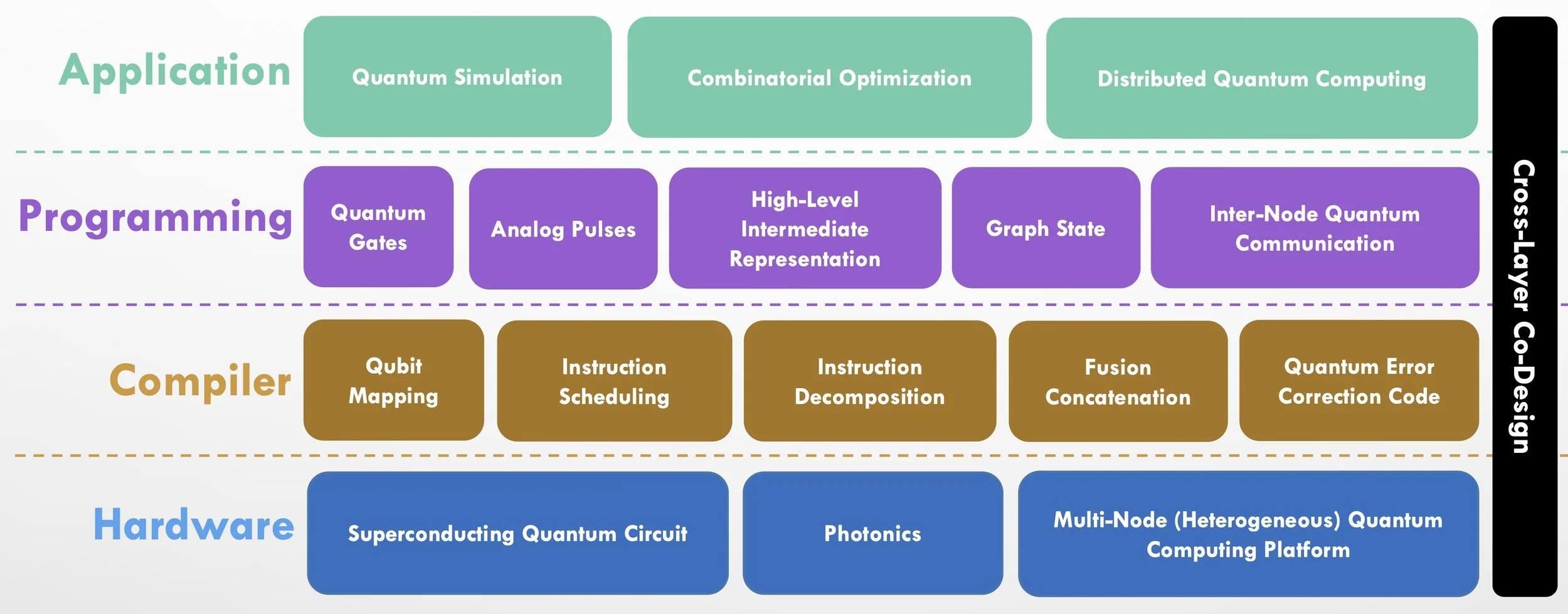Quantum Computing System
As the new “race to the moon”, quantum computing can possibly trigger a computation revolution due to its strong potential in several important domains, e.g., cryptography, chemistry simulation, optimization, machine learning. We believe that it is now when computer scientists should take the leading role to unify the efforts from theory to engineering towards large-scale fault-tolerant quantum computers. However, as an emerging area, grand challenges remain ahead since state-of-the-art QC, from software to hardware, is still highly immature.
Our research covers multiple technology stacks in the quantum computing system. Starting from single-node quantum computers, we are seeking to accommodate quantum system of large scale in several directions. The computation capability of a single quantum processing substrate can be bounded and we need distributed quantum computing to scale-up our quantum computer system. Meanwhile, different qubit technologies have their own pros and cons and we should systematically leverage their advantages. Finally, the quantum error correction code is essential to fighting againt the build-in noise to make large-scale quantum computing practical.
Single-Node Quantum Computer
Several quantum computer prototypes of different qubit technologies have been demonstrated and rapidly evolving. We are now in the vacuum-tube era or even pre vacuum-tube era of quantum computing. With the promising quantum applications and device technologies, we are now investigating the quantum system design (e.g., programming language, compiler, architecture) from the single-node setting.
Quantum Error Correction
Quantum computers are vulnerable to noise from the environment or imperfect hardware, as this destroys the coherence of the quantum states used in computations. Hence, one of the main challenges for achieving a universal fault-tolerant quantum computer is the development of techniques, known as quantum error correction (QEC) codes, to protect quantum information against errors. We are building the fault-tolerant quantum computing stack by codesigning QEC codes with quantum architectures.
Distributed Quantum Computing
Leading quantum computing platforms, no matter superconducting qubits or trapped ion qubits, experience difficulty to support large-scale quantum computers, either due to qubit frequency collision or because of qubit control difficulty. We are investigating the potential of distributed quantum computing, not only to give sweets to quantum computing scaling but also to keep pace with quantum network progression.
Photonics Quantum Computing
Among various quantum hardware technologies, photonic platform may stand out not only because photonic quantum computers can potentially work in an atmospheric environment at room temperature, but also because they can be easily integrated with quantum communication. As a group in computer science, our research focuses on developing compilers that adapt quantum programs to prospective hardware models with practical constraints in an efficient and scalable manner.




